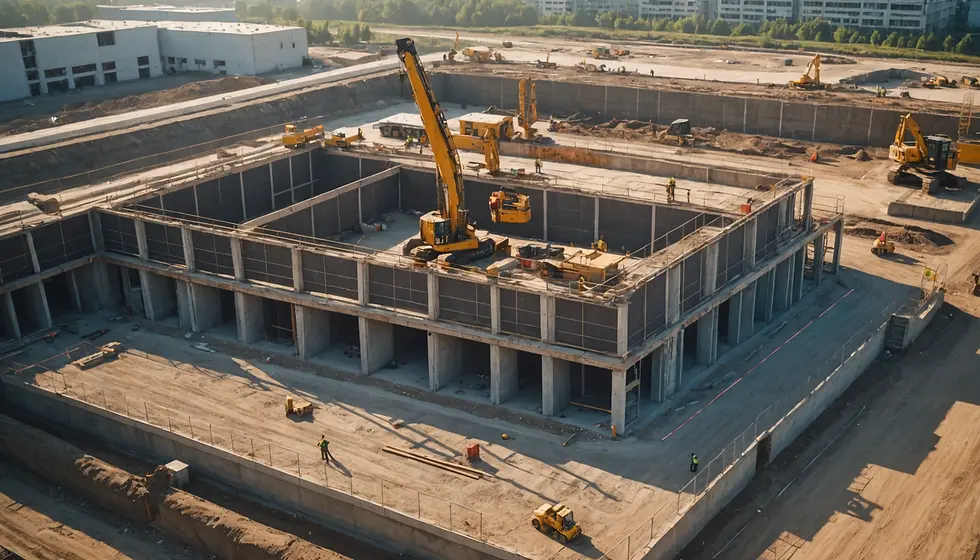The Fallout of Real Estate Flip Fails
- Staff Writer
- Dec 4, 2024
- 5 min read

Flipping houses can be a challenging endeavor filled with promise. Investors are often drawn by the potential to transform a rundown property into a coveted dream home, and to earn significant profits from it. However, the reality is that not all flips succeed. Problems such as unexpected repairs, shifting market dynamics, or poor budgeting and planning can quickly turn potential success into potential ruin and failure.
In this post, we'll take a look at the effects of a failed flip and outline practical strategies to navigate their challenges. By understanding potential pitfalls and learning from them, investors can move forward with renewed confidence.
The Financial Fallout of Real Estate Flip Fails
The financial consequences of a failed real estate flip can be severe. Many investors invest considerable time and money into renovations, only to find themselves unable to recover those costs.
Hidden Costs
Unexpected expenses can dramatically affect the profitability of a flip. An investor may set a budget for renovations but later discover hidden problems like mold or a foundation problems. The cost to remediate these unexpected issues can get out of hand quickly, turning a potential profit into a significant loss. According to a recent study, nearly 40% of house flippers encounter hidden costs that exceed their initial estimates and any reserves they may have.
Holding Costs
Holding costs can quickly accumulate when a property doesn’t sell as planned. These costs include mortgage payments & interest, loan extension fees, property taxes, and utility bills. If an investor has a property that stays on the market for longer than expected, holding costs quickly chip away at any expected profits. The temptation is often to try to sell for more, but when market conditions decline, waiting for a better offer may result in a sale at a loss, and the longer at property stays on the market the harder it is to sell at its' highest value.
Emotional Toll
Beyond finances, failed flips can take an emotional toll on investors. The disappointment of a project not going as planned can lead to feelings of frustration, anxiety and fear.
Stress and Anxiety
The uncertainty surrounding a failed flip can contribute to increased stress levels. Investors may worry about meeting financial obligations while managing repairs or seeking sales. In studies, nearly 60% of investors reported feeling increased anxiety when their properties lingered unsold beyond the projected timeline.
Loss of Confidence
Experiencing a failed flip can lead to self-doubt and hesitation in making important decisions. Investors may begin to question their judgment and decision-making skills. Many find themselves mulling over questions such as, “What could I have done differently?” or choosing not to make decisions or take actions out of fear of making another mistake. Such doubts can make existing problems worse, deter future investments or cause hesitation in taking on new projects.
Legal Challenges
Legal complications can arise during a failed flip, complicating an already difficult situation.
Contractor Disputes
Disputes with contractors can be time-consuming and costly. Issues such as incomplete work or missed deadlines can lead to escalating tensions. If an investor hires a contractor, only to find their work unsatisfactory, they may need to invest an additional money to rectify the situation with another professional. If an investor runs out of money and is unable to pay their contractors, work often stops leaving few options to get the project completed and will result in liens on the property and eventually legal actions and potentially the loss of the property.
Buyer Legalities
Problems with disgruntled buyers can lead to legal action. If they've discovered undisclosed issues after purchase, there could be exposure to significant legal risk. This can saddle the investor with substantial legal fees and repair costs. Failure to disclose significant problems can lead to lawsuits that could lead to significant costs and losses.
Market Considerations
Market conditions are critical in real estate. Changes in the economy can quickly impact the viability of a flip.
Market Fluctuations
Real estate markets can shift rapidly. If a flourishing area sees a sudden economic downturn, property values can drop by as much as 20% in a short period of time. This decline can lead to properties remaining unsold for extended periods driving up costs and reducing or even eliminating any potential profit. Investors must be vigilant and ready to adapt their strategies based on real-time market assessments.
Location Dynamics
The location of a property plays a significant role in its potential success. Even a well-renovated home may struggle to sell if it's situated in a less desirable area. Properties in neighborhoods that are experiencing declining interest can lose value quickly. Investors should research local trends and demographics before making a purchase to identify areas with reliable growth potential. It's also important to continue to monitor the local market to be aware of any changes occuring or anticipated to the market.
Recovery Steps
Despite the challenges faced from a failed flip, investors can take steps to recover and set the stage for future success.
Assess the Situation
The first step is to conduct a thorough evaluation of the failed flip. Understanding what went wrong is vital. This could involve reviewing financial statements, renovation plans, and market research data. By pinpointing key issues, investors can make informed decisions moving forward.
Cut Losses
If a property is unlikely to sell for a profit, it may be wise to sell it at a lower price. This can help prevent further financial strain. While it may feel like a defeat, cutting losses can be a strategic decision in a volatile market. Quick action can mitigate additional losses and free up capital for future opportunities. Remember that a property will only sell for what someone is willing to pay for it, and whether or not you're making a profit rarely factors into their decision.
Re-evaluate Future Strategies
Investors should take the time to learn from their mistakes. A failed flip can reveal gaps in budgeting, project timelines, or market analysis. By refining these strategies, investors can avoid similar problems in future projects. Establishing a more detailed budget or a stricter project timelines and management can provide a clearer path to success.
Seek Professional Help
Engaging professionals can provide valuable resources and expertise. Professionals can offer guidance on pricing, market trends, renovation choices, budgeting, project management, and much more. Their expertise can help investors make smarter decisions that enhance the potential for success.
Learning from Experience
Failures in real estate flipping can provide powerful lessons. Experienced investors know that these experiences can provide valuable knowledge for greater success in future projects.
Keep Detailed Records
Maintaining meticulous records can offer significant benefits. By documenting expenses, timelines, and strategies, investors can create a roadmap for future ventures. Learning from past successes and failures prepares investors for future opportunities.
Network with Other Investors
Building connections with other investors can be invaluable. Networking leads to shared experiences and knowledge. Engaging in local investor groups can expose investors to diverse strategies and insights that can aid in overcoming challenges. Collaborating with others fosters a sense of community and support.
Moving Forward with Confidence
Managing a failed real estate flip is not easy, but with the right strategies and perspective, it is possible to recover and grow. The financial burden, emotional distress, and legal hurdles posed by a failed flip can be daunting. Yet, they can also offer invaluable lessons for future endeavors.
Investors should recognize that the real estate journey is filled with ups and downs. Each setback provides an opportunity for learning and improvement. By revising assessment, seeking guidance, and adapting strategies, investors can approach real estate flipping with renewed determination and knowledge.
In this ever-changing real estate environment, resilience remains key. Embracing challenges and learning from them can create a pathway to more successful investment experiences.
JB Properties is experienced in turning around failing real estate investments. Contact us to discuss your situation and see if we can help you.
.png)

Comments